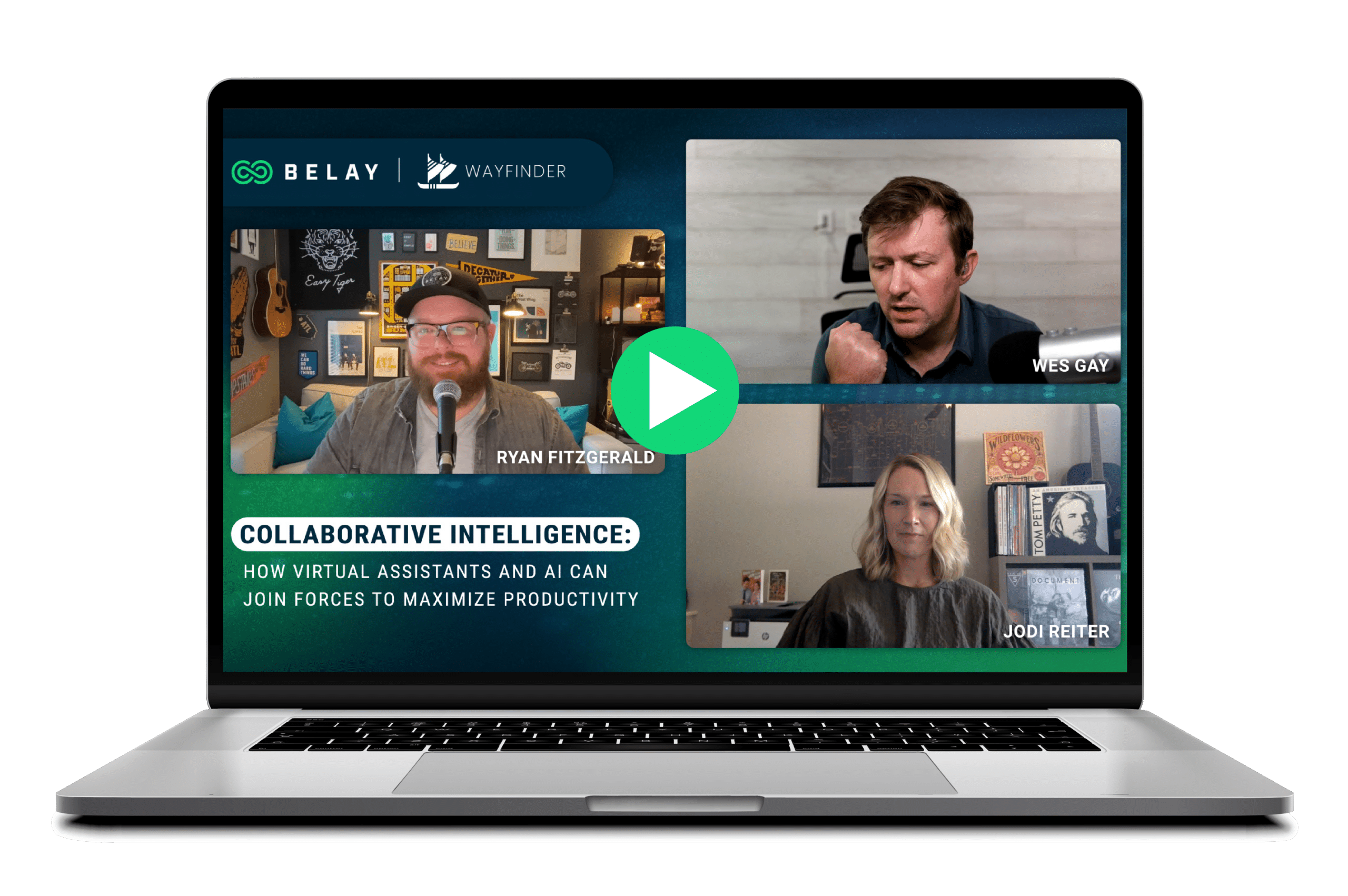AI Enables Your BELAY Executive Assistant to Maximize Efficiency Through …
- Email Management & Prioritization
Filtered and prioritized emails based on importance,
urgency, and sender, allowing your Assistant to focus on
high-priority emails first. - Scheduling & Calendar Optimization
Suggested meeting times based on participants’ calendars,
adjustments for time zones and automatically scheduled
recurring meetings based on predefined preferences. - Data Entry & Management
Automated data entry by extracting key information from
documents, databases, or spreadsheets to significantly
speed up tasks like client record updates. - Document Creation & Editing
Generated reports, meeting summaries, and proposals,
including proofreading and suggested edits for clarity and
grammar, improving both speed and quality. - Task Automation & Workflow Management
Automated recurring tasks based on priorities, send
reminders, and even track the completion of tasks to
streamline project management. - Research & Information Gathering
Sifted online data and summarized relevant topics, industries,
or competitors for market research, background checks, or
report preparation.
Stop trying to do it all. Accomplish More by Hiring a BELAY Executive Assistant.
AI Enables Your BELAY Accounting Professional to Maximize Efficiency Through …
- Invoice Processing & Reconciliation
Automated data extraction from invoices, matching them to
purchase orders and reconciling discrepancies. - Expense Management & Categorization
Expedited classification of business expenses and flagged
outliers, speeding up the approval process and simplifying
financial reporting. - Payroll Processing & Compliance Monitoring
Automated payroll calculations, deductions, and tax filings
while tracking changes in tax laws, and applying them to
payroll systems in real-time to reduce errors and penalties. - Financial Forecasting & Cash Flow Predictions
Forecasted cash flow, revenue, and expenses while analyzing
historical financial data, market trends, and current financial
performance. - Fraud Detection & Risk Assessment
Real-time transactional data analysis to detect anomalies and
potential fraud patterns, such as irregularities in financial
records to reduce the risk of financial fraud. - Budgeting & Financial Planning
Budget development from automatically consolidated
financial data to identify spending patterns to help CFOs and
Controllers make informed decisions on resource allocation.
Your Finances. Done Right.
Accounting Services from BELAY.
AI Enables Your BELAY Marketing Assistant to Maximize Efficiency Through …
- Content Creation & Copywriting
Generated blog posts, social media content, and email
marketing copy that matches your brand’s tone and style and
is tailored to specific platforms or audiences. - SEO Optimization & Keyword Research
Analyzed site content and suggested improvements for search
engine ranking, including the most effective keywords,
competitor analysis, and optimization. - Social Media Management & Automation
Automated scheduling and posting of social media content
across platforms, optimizing posting times for maximum
engagement, allowing MAs to focus on strategy. - Market Research & Audience Analysis
Data analyzed from different sources to understand customer
behavior, preferences, and trends to create more impactful,
personalized marketing campaigns. - Email Marketing Automation & Personalization
Segmented email lists, personalized content created for
different audiences, and optimized send times to improve
open and conversion rates. - Campaign Performance Analysis & Reporting
Real-time marketing campaign analytics, tracking metrics such
as engagement, conversion rates, and ROI based on real-time
performance data.
Marketing can be a full-time job. But it’s not yours. Let a BELAY Marketing Assistant help.
From the BELAY Blog

Executive Assistants 2.0: The Future of Human-AI Collaboration for Maximized Productivity
Executive Assistants are evolving into powerful AI-driven partners, transforming industries and redefining the future of work.
Blog Post

AI For Executives: Navigating the Advancements of Artificial Intelligence
In this guest blog post, Joshua Rystedt, CEO of R Creative, will share his insights on AI technologies and their applications in various industries, offer tips on how to use AI-powered analytics and more.
Blog Post

How Executive Assistants Can Streamline Work with AI Prompt Generators
Looking for ways to improve your efficiency? We have you covered with tips on the best ways to use ChatGPT and other AI tools in your daily tasks.
Blog Post

Accelerating Creativity: 5 Practical Ways To Use AI To Improve Your Creative Work
In this webinar, our Director of Marketing Ryan Fitzgerald, Marketing Manager Ebony Clark, and Video Production & Content Designer Ben Ackerley discuss how AI is transforming creativity in the workplace.
Blog Post

The Way Of The Future: Executive Assistants & Artificial Intelligence
Let’s explore the different ways in which copywriting AI can be used to serve you and help your organization stand out in a crowded marketplace.
Blog Post

SMART EA: How AI & EAs Work Together For A More Efficient Outcome
An AI and a VA are not the same thing but can be a great team when they work together.
Blog Post
Webinars

Collaborative Intelligence: How Executive Assistants and AI Can Join Forces To Maximize Productivity
Join BELAY’s Director of Marketing, Ryan Fitzgerald, StoryBrand guide Wes Gay, and his Executive Assistant Jodi Reiter as we explore how AI is revolutionizing productivity.
Learn about the most impactful AI tools in the market and how to weave them into your daily tasks.
Introducing
Essential AI Tools for Assistants:
A Comprehensive Guide to Leveraging AI to Elevate Your Services
We've gathered a list of over 30 essential AI tools for your Executive Assistant to utilize to help you elevate your service and enhance productivity.
DOWNLOAD![]()
Introducing
Do's & Don'ts of AI Chatbots
AI is a powerful tool — but like any tool, it’s important to use it wisely.
BELAY’s Dos & Don’ts of AI guide will help you navigate AI with confidence, so you can boost your productivity without sacrificing security or accuracy. Download our guide now and start making AI work for you — safely and effectively!
DOWNLOAD![]()